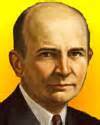A Quote by Martin H. Fischer
Don't confuse hypothesis and theory. The former is a possible explanation; the latter, the correct one. The establishment of theory is the very purpose of science.
Quote Topics
Related Quotes
To be sure, Darwin's theory of evolution is imperfect. However, the fact that a scientific theory cannot yet render an explanation on every point should not be used as a pretext to thrust an untestable alternative hypothesis grounded in religion into the science classroom or to misrepresent well-established scientific propositions.
Those who promote the politically correct theory are favored with billions from government grants and neo-Marxist environmentalist largesse, and official recognition and award. Faked and tampered data and evidence has arisen in favor of the politically correct theory. Is not man-caused, catastrophic global warming now the only theory allowed to be taught in the West?
Any strategy that attempts to reinforce faith by undermining science is also doomed to failure. Showing that some scientific theory is wrong will not prove that the religious alternative is correct by default. When the sun was shown not to be the center of the universe, as Copernicus had proposed, the Earth was not moved back to that singular position in the cosmos. If Darwinian evolution is proved wrong, biologists will not develop a new theory based on the hypothesis that each species was created separately by God 6,000years ago.
To construct a scientific theory from the data and to be able to recognize that it is a reasonable theory is possible only if there are some very sharp restrictive principles that lead you to go in one direction and not in another direction. Otherwise, you wouldn't have science at all, merely randomly chosen hypotheses.
There is the theory that all the living forms in the world have arisen from a single source which itself came from an inorganic form. This theory can be called the 'general theory of evolution,' and the evidence which supports this is not sufficiently strong to allow us to consider it as anything more than a working hypothesis.
The beauty of string theory is the metaphor kind of really comes very close to the reality. The strings of string theory are vibrating the particles, vibrating the forces of nature into existence, those vibrations are sort of like musical notes. So string theory, if it's correct, would be playing out the score of the universe.
[Theory is] an explanation that has been confirmed to such a degree, by observation and experiment, that knowledgeable experts accept it as fact. That's what scientists mean when they talk about a theory: not a dreamy and unreliable speculation, but an explanatory statement that fits the evidence. They embrace such an explanation confidently but provisionally - taking it as their best available view of reality, at least unil some severely conflicting data or some better explanation might come along.
New knowledge has led to the recognition in the theory of evolution of more than a hypothesis. It is indeed remarkable that this theory has been progressively accepted by researchers, following a series of discoveries in various fields of knowledge. The convergence, neither sought nor fabricated, of the results of work that was conducted independently is in itself a significant argument in favor of this theory.
Catastrophe Theory is-quite likely-the first coherent attempt (since Aristotelian logic) to give a theory on analogy. When narrow-minded scientists object to Catastrophe Theory that it gives no more than analogies, or metaphors, they do not realise that they are stating the proper aim of Catastrophe Theory, which is to classify all possible types of analogous situations.


































